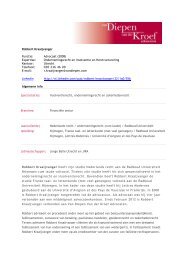© Van Diepen Van der Kroef Advocaten
© Van Diepen Van der Kroef Advocaten
© Van Diepen Van der Kroef Advocaten
- No tags were found...
You also want an ePaper? Increase the reach of your titles
YUMPU automatically turns print PDFs into web optimized ePapers that Google loves.
consi<strong>der</strong>ation 3.3.6). Un<strong>der</strong> legal consi<strong>der</strong>ation 3.3.2 the Hoge Raad held with reference toan employee of an international organisation proceeding against the employer:‘The question whether, and if so in which cases an appeal to the privilege of immunityfrom jurisdiction by an international organisation must be upheld is principally ofimportance in the light of – and arises in these proceedings exclusively in relation to – thejurisdiction of the court of the host country. Giving an answer to this question requires inprinciple a weighing of two interests, each weighty but conflicting: on one side, theinterest of the international organisation that un<strong>der</strong> all circumstances the independent andunimpeded performance of its tasks is guaranteed; on the other, the interest of the otherparty that its dispute with the international organisation will be heard and resolved by anindependent court.’It was also expressly held in the case cited that the fact that the allegedly culpable conductfell within the functional immunity was not an obstacle to the weighing of interests referredto above (see legal consi<strong>der</strong>ation 3.3.5).Even if the District Court were to hold that the allegedly culpable conduct of the UN fellwithin the functional immunity, the right of access to the Court must be weighed againstthat immunity.119. The Association et al. also finds support for its propositions in the caselaw of the DistrictCourt The Hague, 28 November 2001, NJkort 2002, 1. The District Court held that it hadjurisdiction to hear a dispute where an international organisation claimed immunity but noalternative effective legal remedy was available. That case concerned a labour disputebetween an international organisation (ISNAR) and an employee (Baur). Such a dispute falls(naturally) within the functional immunity. The District Court also established that un<strong>der</strong>legal consi<strong>der</strong>ation 5.3. ISNAR had asserted in the proceedings that its staff regulationsprovided an alternative legal remedy. That assertion was dismissed by the District Court(see legal consi<strong>der</strong>ation 5.10):‘Baur et al. have argued that the proceedings referred to in Article 16 of the staffregulations do not in this present case constitute an effective judicial process and offerinsufficient protection. Reference was made in particular to the absence of informationon this judicial process or to time periods and to the fact that there has been noimplementation of the “regulations” within ISNAR itself: the ISNAR Appeal<strong>©</strong> <strong>Van</strong> <strong>Diepen</strong> <strong>Van</strong> <strong>der</strong> <strong>Kroef</strong> <strong>Advocaten</strong> page 52 of 99
















